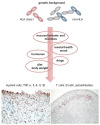The Genetic, Environmental, and Immunopathological Complexity of Autoantibody-Negative Rheumatoid Arthritis
- PMID: 34830268
- PMCID: PMC8618508
- DOI: 10.3390/ijms222212386
The Genetic, Environmental, and Immunopathological Complexity of Autoantibody-Negative Rheumatoid Arthritis
Abstract
Differences in clinical presentation, response to treatment, and long-term outcomes between autoantibody-positive and -negative rheumatoid arthritis (RA) highlight the need for a better comprehension of the immunopathogenic events underlying the two disease subtypes. Whilst the drivers and perpetuators of autoimmunity in autoantibody-positive RA have started to be disclosed, autoantibody-negative RA remains puzzling, also due its wide phenotypic heterogeneity and its possible misdiagnosis. Genetic susceptibility appears to mostly rely on class I HLA genes and a number of yet unidentified non-HLA loci. On the background of such variable genetic predisposition, multiple exogeneous, endogenous, and stochastic factors, some of which are not shared with autoantibody-positive RA, contribute to the onset of the inflammatory cascade. In a proportion of the patients, the immunopathology of synovitis, at least in the initial stages, appears largely myeloid driven, with abundant production of proinflammatory cytokines and only minor involvement of cells of the adaptive immune system. Better understanding of the complexity of autoantibody-negative RA is still needed in order to open new avenues for targeted intervention and improve clinical outcomes.
Keywords: anti-citrullinated protein antibodies; pathogenesis; rheumatoid arthritis; rheumatoid factor; seronegative.
Conflict of interest statement
S.B. reports grant/research support from: Pfizer, and personal fees from: AbbVie, Bristol-Myers Squibb, Eli Lilly, Gilead, Pfizer, Sanofi. C.M. reports personal fees from: AbbVie, Bristol-Myers Squibb, Eli Lilly, Gilead, Pfizer, Roche, Sanofi.
Figures
Similar articles
-
The Impact of Cigarette Smoking on Risk of Rheumatoid Arthritis: A Narrative Review.Cells. 2020 Feb 19;9(2):475. doi: 10.3390/cells9020475. Cells. 2020. PMID: 32092988 Free PMC article. Review.
-
Non-HLA genes PTPN22, CDK6 and PADI4 are associated with specific autoantibodies in HLA-defined subgroups of rheumatoid arthritis.Arthritis Res Ther. 2014 Aug 20;16(4):414. doi: 10.1186/s13075-014-0414-3. Arthritis Res Ther. 2014. PMID: 25138370 Free PMC article.
-
HLA-DRB1 Haplotypes, Shared Epitope, and Disease Outcomes in US Veterans with Rheumatoid Arthritis.J Rheumatol. 2019 Jul;46(7):685-693. doi: 10.3899/jrheum.180724. Epub 2019 Mar 1. J Rheumatol. 2019. PMID: 30824656 Free PMC article.
-
Associations of HLA-DRB1 alleles with anti-citrullinated protein antibody-positive and anti-citrullinated protein antibody-negative rheumatoid arthritis in northern east part of Turkey.Int J Rheum Dis. 2012 Dec;15(6):538-45. doi: 10.1111/j.1756-185X.2011.01604.x. Epub 2011 Mar 4. Int J Rheum Dis. 2012. PMID: 23253237
-
[Is rheumatoid arthritis without anti-citrullinated peptide antibody a genetically distinct subset?].Nihon Rinsho Meneki Gakkai Kaishi. 2009 Dec;32(6):484-91. doi: 10.2177/jsci.32.484. Nihon Rinsho Meneki Gakkai Kaishi. 2009. PMID: 20046016 Review. Japanese.
Cited by
-
Indigenous Nigeria medicinal herbal remedies: A potential source for therapeutic against rheumatoid arthritis.Exp Biol Med (Maywood). 2022 Jul;247(13):1148-1178. doi: 10.1177/15353702221102901. Epub 2022 Jun 16. Exp Biol Med (Maywood). 2022. PMID: 35708153 Free PMC article. Review.
-
Long noncoding RNA/circular RNA regulates competitive endogenous RNA networks in rheumatoid arthritis: molecular mechanisms and traditional Chinese medicine therapeutic significances.Ann Med. 2023 Dec;55(1):973-989. doi: 10.1080/07853890.2023.2172605. Ann Med. 2023. PMID: 36905646 Free PMC article. Review.
-
Inflammatory Arthritis and Bone Metabolism Regulated by Type 2 Innate and Adaptive Immunity.Int J Mol Sci. 2022 Jan 20;23(3):1104. doi: 10.3390/ijms23031104. Int J Mol Sci. 2022. PMID: 35163028 Free PMC article. Review.
-
Pharmacogenetic Basis of Response Fluctuations to Methotrexate in Rheumatoid Arthritis: A Narrative Review.Curr Rheumatol Rev. 2025;21(2):160-168. doi: 10.2174/0115733971285147240327051637. Curr Rheumatol Rev. 2025. PMID: 38566379 Review.
-
Identifying Targets and Drugs for Rheumatoid Arthritis Stratified Therapy Using Mendelian Randomization and a Pretraining Model.Int J Mol Sci. 2025 Jun 13;26(12):5686. doi: 10.3390/ijms26125686. Int J Mol Sci. 2025. PMID: 40565149 Free PMC article.
References
-
- Westerlind H., Rönnelid J., Hansson M., Alfredsson L., Mathsson-Alm L., Serre G., Cornillet M., Holmdahl R., Jakobsson P., Skriner K., et al. Anti–Citrullinated Protein Antibody Specificities, Rheumatoid Factor Isotypes, and Incident Cardiovascular Events in Patients with Rheumatoid Arthritis. Arthritis Rheumatol. 2020;72:1658–1667. doi: 10.1002/art.41381. - DOI - PubMed
-
- Matthijssen X.M.E., Niemantsverdriet E., Huizinga T.W.J., van der Helm-van Mil A.H.M. Enhanced treatment strategies and distinct disease outcomes among autoantibody-positive and -negative rheumatoid arthritis patients over 25 years: A longitudinal cohort study in the Netherlands. PLoS Med. 2020;17:e1003296. doi: 10.1371/journal.pmed.1003296. - DOI - PMC - PubMed
-
- Boeters D.M., Gaujoux-Viala C., Constantin A., van der Helm-van Mil A.H. The 2010 ACR/EULAR criteria are not sufficiently accurate in the early identification of autoantibody-negative rheumatoid arthritis: Results from the Leiden-EAC and ESPOIR cohorts. Semin. Arthritis Rheum. 2017;47:170–174. doi: 10.1016/j.semarthrit.2017.04.009. - DOI - PubMed
-
- Courvoisier D.S., Chatzidionysiou K., Mongin D., Lauper K., Mariette X., Morel J., Gottenberg J.-E., Bergstra S.A., Suarez M.P., Codreanu C., et al. The impact of seropositivity on the effectiveness of biologic anti-rheumatic agents: Results from a collaboration of 16 registries. Rheumatology. 2020;60:820–828. doi: 10.1093/rheumatology/keaa393. - DOI - PubMed
Publication types
MeSH terms
Substances
LinkOut - more resources
Full Text Sources
Medical
Research Materials


